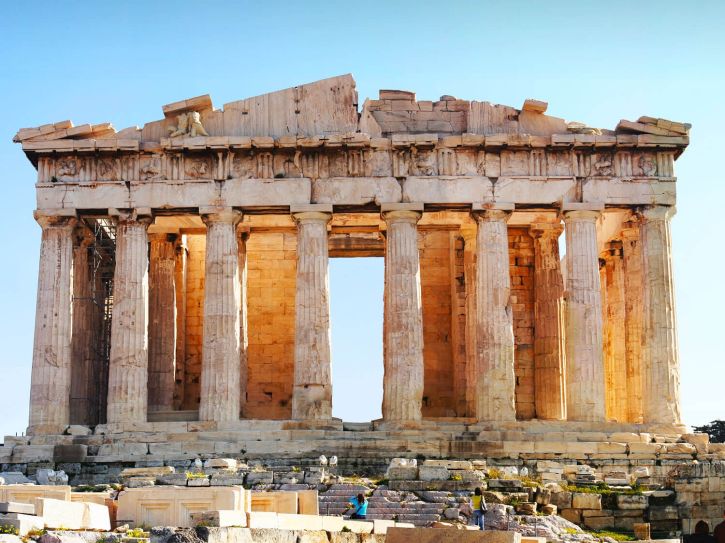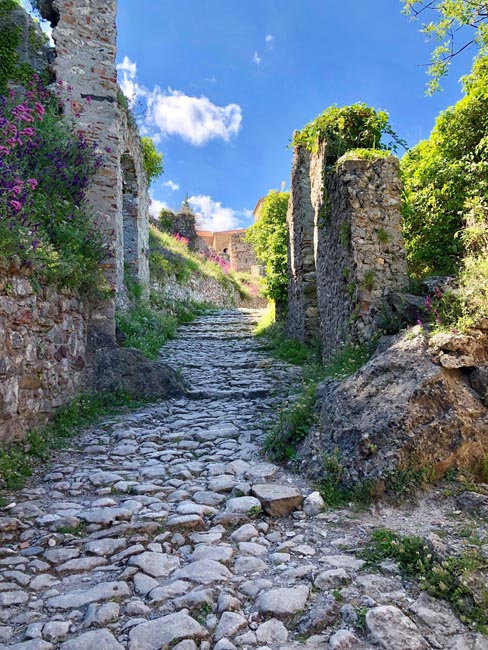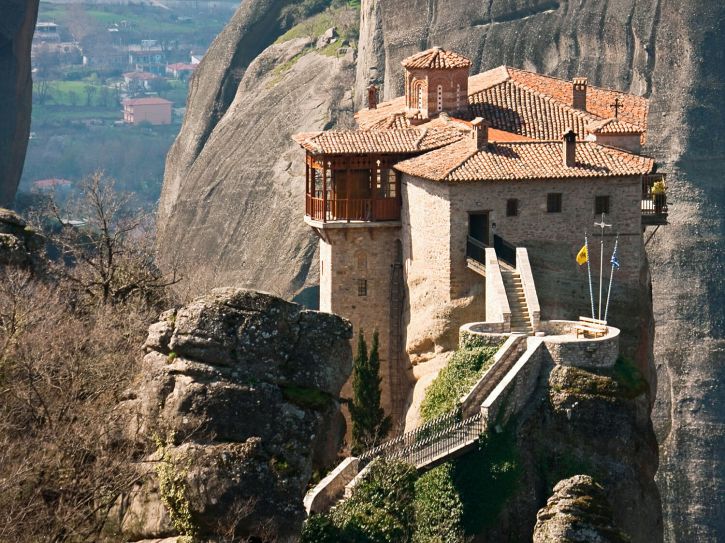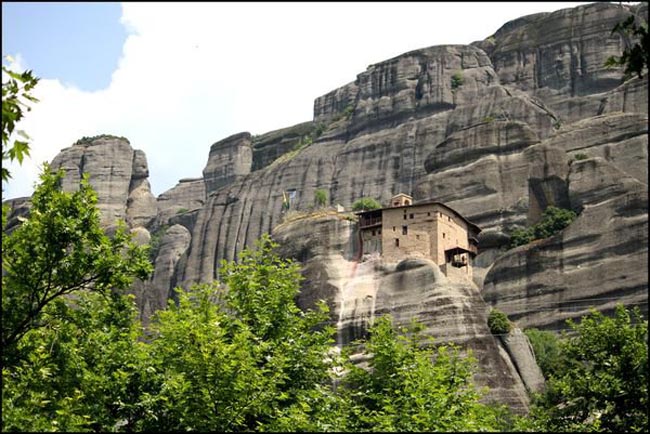As the birthplace of western democracy, there is something strangely familiar to those who partake on our Greece tours. Perhaps it is the folklore, the monuments, or the legends that we have heard of over time that allows the traveller to feel both in awe yet at home while exploring this ancient land. Or perhaps it is that Greek hospitality and lust for life that oozes into every aspect of Greece that leaves visitors filled with wonder. Whatever the case, Greece has the right recipe for a classic journey full of history, arts, scenic landscapes, and memorable people.
By exploring the remains of some of Greece's most rewarding sites such as the Temple of Zeus in Olympia or the sanctuary at Delphi, it is not hard to imagine the extensive power and prestige that Greece once held. Clues to their strength is also apparent with visits to Sparta, where the most formidable army in Greece once lived, or at the fortresses of Mystras which became a sanctuary of refugees who flourished within the impregnable walls during the middle ages as war and invasions surrounded this city.
It was during the turmoil of the middle ages that Greece had a resurgence of culture, with the creation of churches of Meteora. Built on sandstone pillars of rock, these complexes which were built in the 11th century contain some of Greece's most important Eastern Orthodox monasteries.
As with any Adventures Abroad small group tour, this tour highlights the character of this fascinating part of this diverse and beautiful part of the country.
Prices below are per person, twin-sharing costs in US Dollars (USD). Pricing does not include airfare to/from the tour and any applicable taxes. For single supplement rates and taxes (if any), please refer to below Prices & Dates table. For general information on flights to/from the tour, click here.
Your Travel and Accommodation Arranged For You
Tips Included for Driver, Restaurant Staff, Local Guides
Authentic Local Experiences With Lots Of Inclusions.
Select a date below to reserve your spot:
Optional Single Supplement: $860 USD (number of singles limited).
This tour may require a mandatory single supplement charge of $430 if you join our share program and we are unable to pair you.
Download Itinerary
Day 1 Arrival in Athens
Today we arrive in Athens, the capital of Greece and the historic capital of Europe.
Athens has a long history dating from the first settlement in the Neolithic age; in the 5th Century BC, the city’s values and civilization acquired a universal significance. In 1834, it became the capital of the modern Greek state and an attractive modern metropolis with unrivalled charm.
Overnight in Athens.
Included Meal(s): Dinner
Day 2 Athens - Mycenae & Epidaurus - Nafplio (Nauplia)
This morning we board our coach to head to Mycenae, a citadel occupying the triangular summit of a low hill between two gorges. The Mycenaeans excelled in this style of building using large, unworked stones. These massive fortifications were begun in the 14th century, followed by Tiryns and Dendra, Argos and Athens, as well as a host of subsidiary forts and eventually, a huge wall across the Corinthian isthmus. The famous Lion Gate, and similar constructions at Gla and Tiryns, were built in the 13th century BC. Here we will see vestiges of a kingdom that, for 400 years (1600-1200 BC), was the most powerful in Greece. We enter through the Lion Gate and see the Great Court where Agamemnon is believed to have been murdered in one of the chambers.
Later we travel to Epidaurus, a sanctuary of Asklepios, the God of Medicine. The sanctuaries of Asklepios, the healer god, were as much sanatoria, health farms or spas, as places of worship. This was the most prestigious centre of the cult in the Classical period and received a galaxy of splendid buildings spanning the whole of the 4th century BC. Epidauros came into prominence only in the later 5th century, when the cult was received at Athens in 420 BC and the tragedian Sophocles became its priest. There was a revival at the sanctuary in the 2nd century AD, and worship on the site continued in the form of a Christian basilica.
We continue toward Nafplio.
Overnight in Nafplio.
Included Meal(s): Breakfast and Dinner
Not finding what you're looking for?
Our specialists can take away the stress and create a private custom tour tailored to your exact interests and budget.
Day 3 Nafplio - Mystras - Monemvasia
We will take some time this morning to stroll through the beautiful sea side town of Nafplio. We will learn the history of this town, particularly relating to its importance in the early 19th Century. Greece won its independence from the Ottomans in slow painful stages throughout the 19th and into the 20th centuries. During the earliest years of the new republic, Nafplio served as the first Greek capital, and it was here that the first head of state of independent Greece, Ioannis Kapodistrias, tried to create a viable polity from the diverse and mutually antagonistic groups who had struggled for independence. But Kapodistrias failed to unite the ever-feuding factions and was eventually assassinated. The "Great Powers" of the day--Britain, France and Germany--stepped in and forced the Greeks to abandon their idea of a republic and instead to become a kingdom. They chose a German prince to rule over the Greeks, Otto of Bavaria, who built his royal palace in the centre of Nafplio. His statue -- not a particularly popular one these days -- stands on a street in the seaside city.
Later today we will travel south, stopping at Mystras,* a Frankish-built Byzantine fortress town dating from the 13th century AD, which served as the Byzantine capital of the Morea as the Peloponnese was known. During the rule of the despots, while the empire plummeted into decline elsewhere, Mystra experienced a renaissance, but then declined under Turkish rule. It was captured by the Venetians in 1687 and it thrived once again with a flourishing silk industry and a population of 40,000. It was recaptured by the Turks in 1715, and from then on it was downhill all the way. It was burned by the Russians in 1770, the Albanians in 1780 and Ibrahim Pasha in 1825. Not surprisingly, at the time of Independence it was in a very sorry state, virtually abandoned and in ruins, though since the 1950s much restoration work has taken place.
We then head southward continuing towards Cape Maleas. This isolated peninsula, located off the east coast of the Peloponnese, is home to a stunningly set town often called the "Gibraltar of the East": Monemvasia. Accessible only by a long causeway, the town is an enormous and ancient fortress.
* Please note that this site is built on a mountainside, which means that exploring it involves hills and stairs and steadiness on one's feet. If you have any concers/questions, please consult with your Tour Leader who will be familiar with your abiltieis at this point in the trip.
Overnight in Monemvasia.
Included Meal(s): Breakfast and Dinner
Day 4 Monemvasia Touring & Free Time
This morning we will have time to stroll through this wonderfully-located ancient town, which reflects influences of the Byzantine, Frankish and Ottoman presence. Famous for Malvasia wines -- Malvasia being the Italian pronunciation of the town's name -- and olive oil. Monemvasia has some excellent museums and churches; we will have a half-day walking tour of Monemvasia and some free time here in the afternoon.
Overnight Monemvasia.
Included Meal(s): Breakfast and Dinner
Day 5 Monemvasia - Nestor's Palace - Mani Peninsula
This morning we travel in a westerly direction to the southernmost peninsula of Greece, known simply as The Mani. We will enjoy a driving tour down this rugged finger of land towards Cape Tenaro, the mythical entrance to the underworld. While on the Mani Peninsula, we will visit the amazing cave systems at Pyrgos Dhirou and learn why this region was often overlooked by invaders. The Dorians never made it this far south, and the Romans passed it by as unimportant. The region did not even accept Christianity until the 9th century AD. Later the Venetians and French, and even the Russians, left this area alone. Even the Turks left the Maniots to themselves, reckoning that they would eventually do themselves in with the violent blood feuds they fought among themselves. Instead, in 1821, the feuding tribes united, rebelled against the Ottomans, and initiated the Greek Wars of Independence which eventually lead to the formation of the modern Greek state.
We will overnight near the village of Oitylou on the Mani Peninsula.
Overnight near Oitylou.
Included Meal(s): Breakfast and Dinner
Day 6 Mani - Olympia Touring
Our drive this morning is a dramatic one, taking us along the far west of the Peloponnese coast with a stop to visit Nestor's Palace, an impressively situated ruin that has only recently been excavated. The palace was the legendary home of wise King Nestor described in Homer's Odyssey.
Further north we come to the ancient site of Olympia, home of the original Olympic Games. We will spend some time visiting the extensive ruins, with its monument Temple of the Olympian Zeus, included in the enumeration of the Seven Wonders of the Ancient World, and the museum that outlines the history of these games that first started here in the 776 BC.
Overnight in Olympia.
Included Meal(s): Breakfast and Dinner
Day 7 Olympia - Delphi Touring
We drive across the Rio-Antirrio Bridge en route to Delphi, arriving in the early afternoon. On arrival we will have a guided tour of this spectacular site and its excellent museum.
According to mythology, Zeus released two eagles at opposite ends of the world and they came to rest at Delphi, the 'navel of the world.' Delphi is known as the centre of worship for the God Apollo, son of Zeus who embodied moral discipline and spiritual clarity. But even before the area was associated with Apollo there were other deities worshipped here including the earth goddess Gea, Themis, Demeter and Poseidon, the well known god of the sea. By the end of the Mycenaean period Apollo had displaced these other deities and became the guardian of the oracle.
Delphi was the site of the Delphic oracle, most important oracle in the classical Greek world, and it was a major site for the worship of the god Apollo. His sacred precinct in Delphi was a Pan-Hellenic sanctuary, where every four years athletes from all over the Greek world competed in the Pythian Games, the precursor to the Olympic Games.
Overnight in Delphi.
Included Meal(s): Breakfast and Dinner
Day 8 Delphi - Kalambaka & The Monasteries of Meteora
Today we drive from Delphi to Kalambaka. Our route takes us through the central plains, a rich agricultural land often referred to as the "bread basket" of Greece.
Later this afternoon, we have a panoramic drive around the Monasteries of Meteora, built upon rocks that rise vertically from the plains below. These "Rocks of the Air" are visible for miles around and are crowned with old monasteries that cling to their summits. The afternoon light provides ideal conditions for photography; making our roadside photo stops today allow us to spend more time on the sites tomorrow when we visit the monasteries.
Overnight in Kalambaka.
Included Meal(s): Breakfast and Dinner
Day 9 The Monasteries of Meteora - Thermopylae - Athens
The Meteora comprise one of the largest and most important complexes of Eastern Orthodox monasteries and is second only to Mount Athos. The monasteries are built on natural sandstone rock pillars at the northwestern edge of the Plain of Thessaly. This morning we visit several monasteries (usually 3 in total; periodic closures determine which ones we visit).
Later today we return by road to Athens visiting Thermopylae, where the great historical battle between the Spartan King Leonidas, the ultimate soldier-king, and the huge army of Persians took place.
Overnight in Athens.
Included Meal(s): Breakfast and Dinner
Day 10 Athens: City Touring
Today we enjoy a guided tour of Athens, the heart and soul of Greece.* A large part of the town's historic centre has been converted into a 3-kilometre pedestrian zone (one of the largest in Europe), leading to the major archaeological sites, reconstructing -- to a large degree -- the ancient landscape, thus allowing us to avoid the city's horrendous traffic. As such, much/most of our tour today will be conducted ON FOOT at a leisurely pace.
We start at the Acropolis (with hopes to beat the heat/crowds), near the site of the Dionysos Theatre. Constructed in the 6th century BC, it is one of the world's oldest theatres and the place where the great works of Aeschylus, Sophocles, Euripides and Aristophanes were first performed. We will also see a more recent theatre, the Odeon of Herod Atticus from the second century AD, which is still used for concerts and performances.
Ascending to the top of the Acropolis, we will see magnificent buildings dating from the 5th century BC, the Golden Age of Athens. On the highest point on the Acropolis is the Parthenon, often considered the finest monument to Greek civilization. The temple was dedicated to Athena "Parthenos," the virgin and patron goddess of the city.
After our Acropolis tour, we'll descend by foot and enter the Ancient Agora located adjacent to the Plaka, the old town of Athens. Among the numerous sights in this archaeological park are the well-preserved Temple of Hephaistos and the landmark Roman era Tower of the Winds.
Our guided tour ends with a guided visit of the Acropolis Museum, located at the foot of the Acropolis. The museum was built to house every artifact found on the rock, from the Greek Bronze Age to Roman and Byzantine Greece; nearly 4,000 objects are exhibited over an area of 14,000 square metres. After our tour you are free to wander and explore on your own or make your way back to the hotel with your Tour Leader's assistance.
* The exact order of our sightseeing in Athens may be altered by your Tour Leader depending on several variables and their judgement on how best to run today's tour.
Overnight in Athens.
Included Meal(s): Breakfast and Dinner
Day 11 Departure
Departure from Athens.
KALO TAXIDI/BON VOYAGE!
Included Meal(s): Breakfast
Inclusions
Breakfast and dinner (mostly local restaurants) daily.
All transport, accommodation, sightseeing and entrance fees for sites noted as 'visited' in the detailed itinerary.
Gratuities for local guides, drivers, restaurant staff, porters.
Airport transfers for land & air customers and for early arriving / late departing land & air customers who book their extra hotel nights through us.
Exclusions
International airfare to/from the tour.
Tour Leader gratuities, lunches, drinks, personal items (phone, laundry, etc), international (if applicable) air taxes, and excursions referenced as 'optional'.
Airport transfers for Land Only customers.
Seasonality and Weather
This tour is offered in early spring and mid-fall, nicely outside of the busy, hot, and expensive summer season, May-September. Because this tour does not rely on highly-seasonal ferry schedules, given that it occurs entirely on the mainland, we can easily and comfortably enjoy the wonders of this scenically stunning and historically rich part of this unbelievably varied country.
SPRING will feature mild temperatures, (mostly) blue skies, green landscapes, and riotous wildflowers. The ancient sites and charming towns we visit will be much quieter than they would be come the month of May, and the local people will be well-rested coming out of winter and happy to see us!
FALL heralds the arrival of a quieter and cooler time of year when the crowds have gone home but the weather remains bright and mild. There may not be the green landscapes typical of spring, but this time of year benefits from the harvest of myriad locally-grown crops that find their way onto local menus.
Transport and Travel Conditions
Road transport throughout by private air-conditioned motor coach, the size-depending on ultimate group size (see 'group size'). Greek roads are very good and distances are not great, though we do have some full, though scenic, travelling days.
This trip is typical of most of our European tours, which are ambitious and involve full days of travel and sightseeing. While we don't have any actual strenuous activity (ie hiking) built into the program, you will do a lot of walking on this trip. These walks will mostly be in the form of walking tours of towns/cities and ancient sites, some of which are large, and some short walks to dinner. Being Europe, and a hilly/mountainous area, cobbles, uneven surfaces, and slopes/stairs are common. If you are accustomed to typical "bus tours," which rely heavily on vehicular transport for all sightseeing activities, you should be aware that this tour is considerably more active.
Am I suitable for this tour? Please refer to our self-assessment form.
Activity Level: 2
These are particularly busy tours that feature a lot of moving around, sometimes by train and short journeys on local transport. Walking tours of towns and cities are leisurely but you should be prepared to be on your feet for several hours. Some of our cultural trips that occur at high altitude and/or require greater independence with baggage handling (at hotels, airports, train stations) also fall into this category.
To learn more about the Activity levels, please visit our tour styles page.
Accommodation
Well-located, air-conditioned, mid-range hotels (3-4 star) throughout. All hotels have en suite bath, though most have shower only. Porter service is usually available on the mainland (see 'Inclusions'). Single rooms are limited and likely smaller than twins.
Staff and Support
Tour Leader throughout, driver (s), local step-on local guides in various locales.
Group Size
Maximum 18 (plus Tour Leader)
Regions visited: Western Europe
Countries visited: Greece
*The red tour trail on the map does not represent the actual travel path.
The following is a list of sample hotels at some locations included on this tour. The hotels shown here are meant to provide a general sense of the standard of hotel we usually aim for; they are not necessarily confirmed for your chosen departure.















The hotel's rooms and suites are spacious and feature free Wi-Fi throughout the premises. All units are elegantly furnished. At Parnassos Delphi Hotel's well-known restaurant, "Epikouros", you can enjoy a variety of exquisite Greek and Mediterranean dishes.



Doupiani House ... situated on the highest point of the area in a quiet green area of six acres adjoining the roots of Meteora.
It has the most panoramic view of the area and that's why it is called "the balcony of Meteora".
Tourcode: GR16





